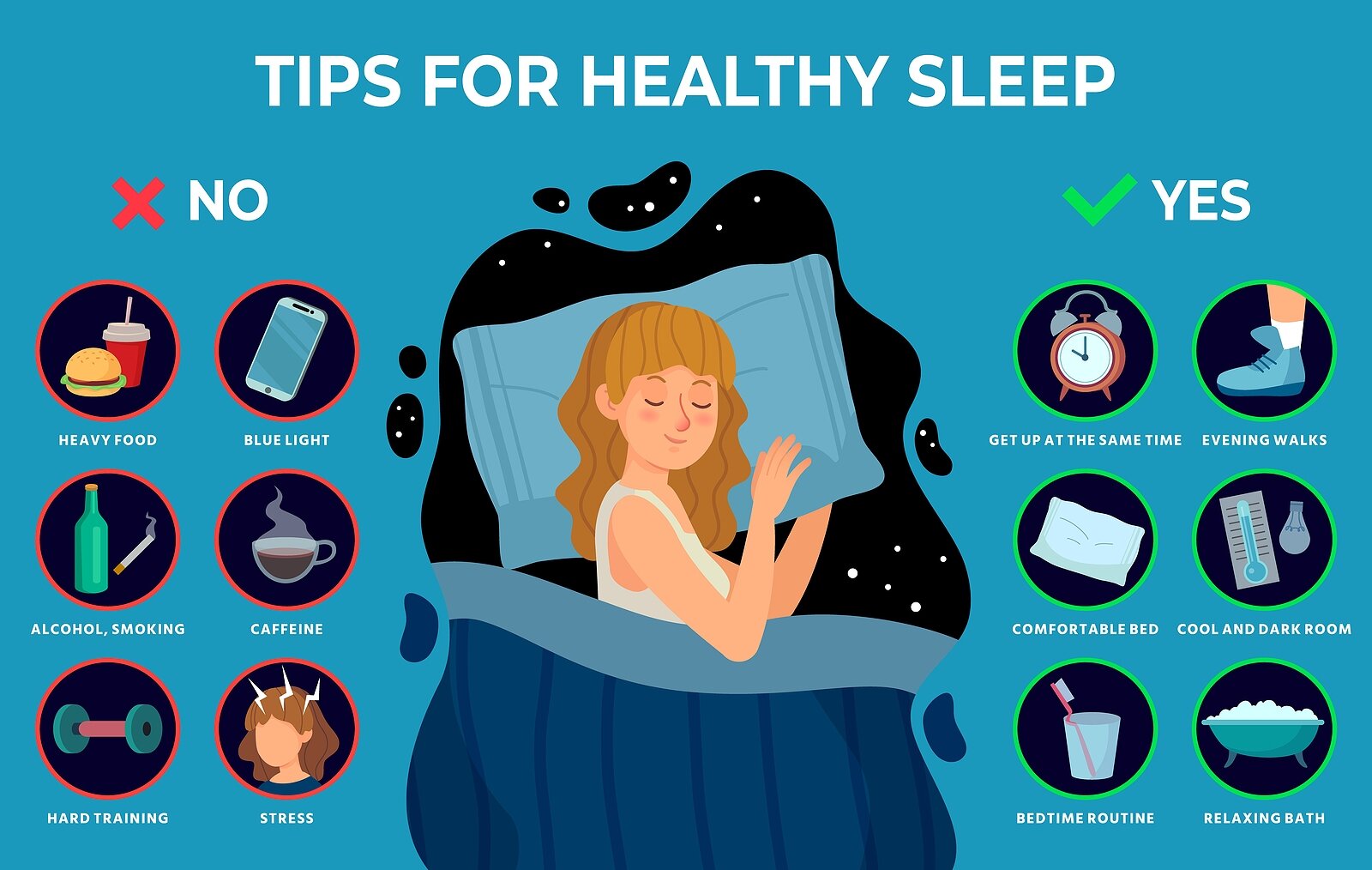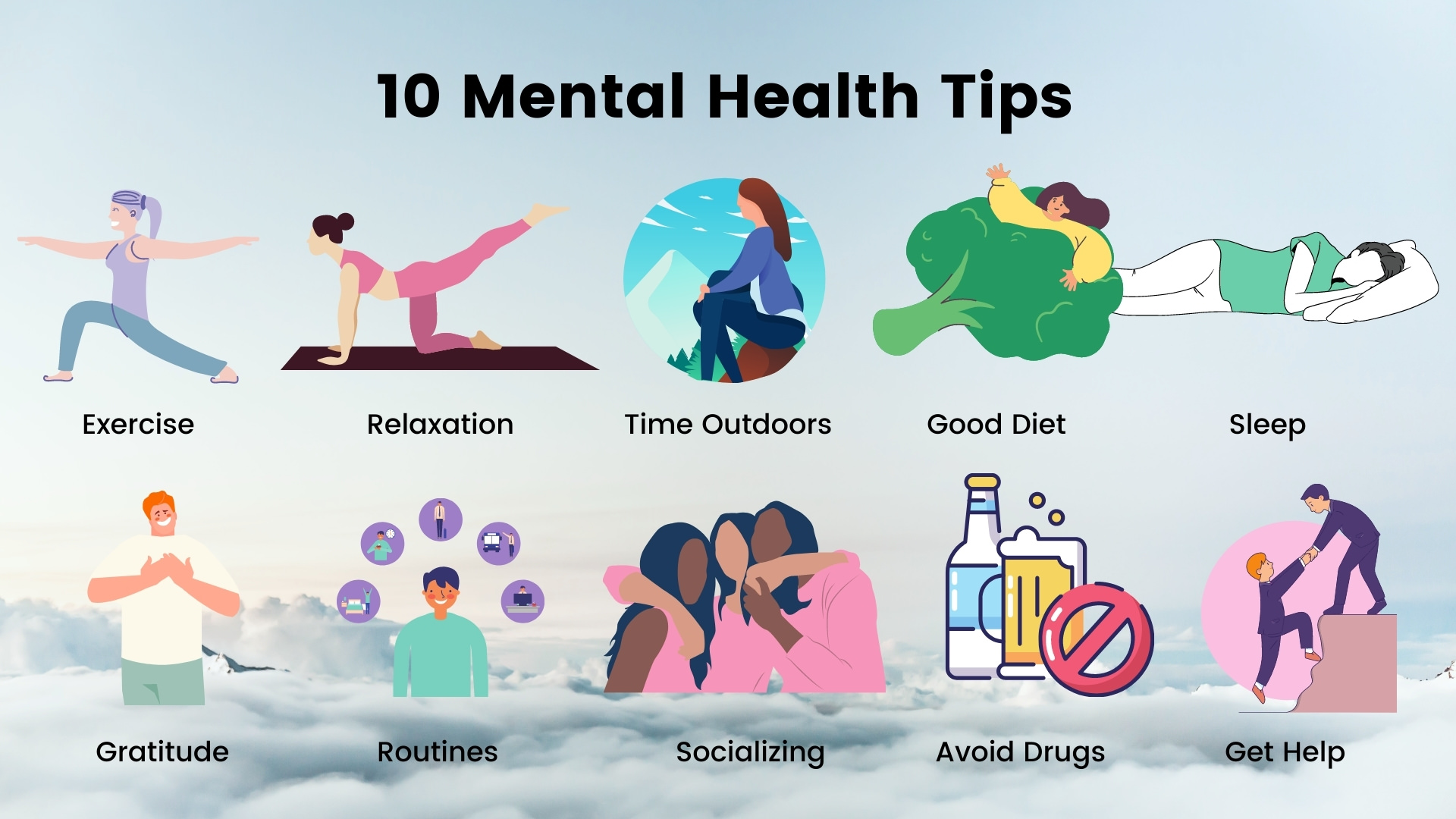Mental Well-Being: Essential Tips for Students to Nurture Their Health. Learn essential tips for students To nurture their mental well-being. Discover effective strategies To maintain a healthy mind & navigate stress in a conversational & jargon-free tone. Prioritize your mental health for a successful journey as a student.
What is Mental Well-Being: Essential Tips for Students To Nurture Their Health & how does it work?
Mental well-being refers To The state of one’s psychological & emotional health. It encompasses how individuals think, feel, & cope with The challenges & stressors of everyday life. For students, nurturing their mental well-being is crucial as it directly impacts their academic performance, relationships, & overall quality of life.
To understand mental well-being, it is important To recognize that it is a multifaceted concept. It involves maintaining a positive mindset, managing stress effectively, developing resilience, & fostering healthy relationships. Students must prioritize their mental health To thrive in their academic journey.
Brief history of Mental Well-Being: Essential Tips for Students To Nurture Their Health
The concept of mental well-being has evolved over time as society recognizes The significance of mental health. In The past, mental health was often stigmatized & neglected. However, advancements in psychology & increased awareness have led To a greater understanding of mental well-being.
Schools & universities have also started prioritizing mental health, providing students with resources & support systems. This shift in mentality has led To The implementation of various strategies & interventions aimed at nurturing students’ mental well-being.
How To implement Mental Well-Being: Essential Tips for Students To Nurture Their Health effectively
Here are some essential tips for students To effectively implement mental well-being in their lives:
1. Prioritize self-care: Engage in activities that promote relaxation & rejuvenation, such as exercise, meditation, or hobbies.
2. Build a strong support system: Surround yourself with positive influences & seek support from friends, family, or mental health professionals when needed.
3. Manage stress: Develop effective stress-coping mechanisms, such as time management, prioritization, & practicing mindfulness.
4. Maintain healthy relationships: Foster supportive & nurturing relationships that contribute To your well-being & provide a sense of belonging.
5. Seek help when needed: If you experience persistent feelings of distress, anxiety, or depression, don’t hesitate To reach out To mental health services available on-campus or within your community.
Key benefits of using Mental Well-Being: Essential Tips for Students To Nurture Their Health
Prioritizing mental well-being offers several benefits To students:
1. Improved academic performance: Mental well-being enhances concentration, memory, & problem-solving skills, leading To better academic outcomes.
2. Enhanced emotional resilience: Developing mental well-being equips students with coping strategies & resilience To navigate challenges effectively.
3. Better relationships: Investing in mental well-being helps in building healthier relationships, improving communication skills, & fostering empathy.
4. Increased productivity & creativity: Positive mental well-being boosts productivity, creativity, & innovation, enabling students To excel in their pursuits.
Challenges with Mental Well-Being: Essential Tips for Students To Nurture Their Health & potential solutions
While nurturing mental well-being is crucial, students can face several challenges:
1. Academic pressure: High expectations, deadlines, & workload can lead To stress. Solution: Time management & seeking support from teachers & counselors can help manage academic stress.
2. Social isolation: Students may experience loneliness & disconnection, especially in an unfamiliar environment. Solution: Join clubs, engage in social activities, & reach out To peers To build meaningful connections.
3. Financial stress: Financial challenges can impact mental well-being. Solution: Seek financial guidance, explore scholarships & part-time job opportunities, & develop a budgeting plan.
Future of Mental Well-Being: Essential Tips for Students To Nurture Their Health
The future of mental well-being for students looks promising as educational institutions continue To prioritize mental health. There will likely be an increase in mental health resources, such as counseling services, mental health workshops, & peer support programs.
Moreover, technological advancements will play a significant role in expanding access To mental health support. Online counseling, smartphone applications, & virtual reality therapy are some examples of innovative ways mental well-being can be promoted in The future.
In conclusion, prioritizing mental well-being is crucial for students To thrive academically & personally. By implementing The essential tips discussed above & seeking support when needed, students can nurture their mental health & lead fulfilling lives.

Mental Well-Being: Essential Tips for Students To Nurture Their Health
Introduction
Maintaining good mental health is crucial for students To thrive academically & personally. The demands of school, social pressures, & transitions can often take a toll on their well-being. As such, it is important for students To prioritize their mental health & develop healthy habits that support their overall well-being. This article aims To provide essential tips for students To nurture their mental health effectively.
Taking Care of Your Physical Health
Physical & mental health are closely intertwined. By taking care of your physical health, you can also support your mental well-being. Here are some tips:
- Engage in regular exercise: Exercise releases endorphins, which boost mood & reduce stress. Find activities you enjoy & aim for at least 30 minutes of exercise most days of The week.
- Get enough sleep: Lack of sleep can negatively impact mental health. Establish a consistent sleep routine & aim for 7-9 hours of quality sleep each night.
- Eat a balanced diet: Proper nutrition is important for brain function & mood regulation. Include fruits, vegetables, whole grains, & lean proteins in your diet.
- Avoid substance abuse: Substance abuse can have severe negative effects on mental health. Steer clear of alcohol, drugs, & tobacco.
Building Supportive Relationships
Strong relationships contribute significantly To mental well-being. Here’s how you can foster positive connections:
- Cultivate friendships: Surround yourself with supportive friends who uplift you & share similar interests. Participate in social activities & develop meaningful connections.
- Communicate effectively: Practice open & honest communication with your friends, family, & peers. Share your thoughts, concerns, & feelings with trusted individuals.
- Seek support: Reach out To counselors, mentors, or support groups when you need assistance. Don’t hesitate To ask for help & guidance.
Managing Academic Stress
Academic pressure can significantly impact mental health. Here are some strategies To manage stress effectively:
- Develop time management skills: Prioritize tasks, set goals, & create a study schedule. Effective time management reduces stress & improves overall productivity.
- Practice self-care: Take regular breaks, engage in activities you enjoy, & practice relaxation techniques such as deep breathing or meditation.
- Set realistic expectations: Avoid perfectionism & set realistic goals for yourself. Understand that it’s okay To make mistakes & that learning is a continuous process.
Engaging in Mindfulness
Mindfulness involves being fully present in The moment & non-judgmentally aware of your thoughts & feelings. Here’s how it can benefit your mental well-being:
- Practice meditation: Set aside a few minutes each day To meditate & focus on your breath. This practice can help reduce stress & improve your overall mental clarity.
- Engage in mindful activities: Whether it’s going for a walk in nature, doing yoga, or engaging in a creative hobby, find activities that bring you a sense of peace & mindfulness.
- Avoid multitasking: Focus on one task at a time & give it your full attention. This approach can reduce stress & improve productivity.
Online Resources & Support
Online students face unique challenges when it comes To mental health. Here are some resources To support your well-being:
Check out this comprehensive guide created by Montgomery County Public Schools that provides valuable information & tips on mental health for students.
For additional resources & tips specifically catered To online students, visit this helpful article from The University of Arizona Online.

The Importance of Mental Well-Being for Students
As students navigate their academic journey, it is crucial To prioritize their mental well-being. The demands of coursework, exams, & social pressures can often take a toll on students’ mental health. Therefore, it is essential for students To develop strategies To nurture their overall well-being. This article will provide essential tips for students To maintain their mental health & achieve a balanced & fulfilling college experience.
Establishing a Supportive Network
One of The fundamental aspects of nurturing mental well-being is establishing a strong support network. Building connections with peers, professors, & other mentors can provide students with a sense of belonging & support. Engaging in extracurricular activities, joining clubs, & participating in community events can facilitate meaningful connections & foster a sense of community. Additionally, seeking guidance from professors or counseling services can offer valuable support during times of stress or difficulty.
A supportive network can also involve friends & family members who understand & empathize with The challenges of student life. Regular communication with loved ones can provide emotional support & serve as a reminder of The importance of self-care & mental well-being.
Furthermore, students can benefit from reaching out To online communities & resources that cater To mental health. Platforms such as forums, support groups, & blogs can be valuable sources of advice & encouragement. However, it is important To verify The credibility of online sources & consult professionals when necessary.
Developing Healthy Coping Mechanisms
College life often presents various stressors that can impact mental well-being. Therefore, it is essential for students To cultivate healthy coping mechanisms To effectively manage stress & anxiety. Engaging in regular physical activity, such as jogging or yoga, can reduce stress levels & improve overall mood. Additionally, practicing deep breathing exercises or mindfulness techniques can help students relax & focus their minds.

Establishing a consistent sleep routine is another crucial aspect of maintaining mental well-being. Adequate sleep is vital for cognitive functioning, mood regulation, & overall physical health. Students should aim for a minimum of seven To eight hours of sleep each night To optimize their mental & physical well-being.
Furthermore, maintaining a balanced diet can significantly impact mental health. Consuming a variety of nutrient-rich foods can enhance brain function & improve overall mood. Students should prioritize incorporating fruits, vegetables, whole grains, & lean proteins into their diets To nourish their bodies & minds.
Managing Time Effectively
Time management is a critical skill for students aiming To maintain their mental well-being. It is essential To strike a balance between academic commitments, extracurricular activities, & personal time. Creating a schedule or using a planner can help students stay organized & ensure they have dedicated time for self-care.
Breaking tasks into smaller, manageable steps can also alleviate feelings of overwhelm. This approach allows students To tackle one task at a time & feel a sense of accomplishment as they make progress. Prioritizing tasks based on urgency & importance can further assist students in managing their time effectively.
Moreover, it is crucial for students To set realistic expectations & avoid overloading themselves with commitments. Learning To say “no” & understanding personal limits is vital for maintaining mental well-being. It is essential To recognize that taking breaks & engaging in self-care activities are not signs of laziness but rather essential components of a healthy & balanced lifestyle.
Seeking Professional Help
While self-care strategies are valuable, it is important To acknowledge that seeking professional help is not a sign of weakness but a proactive step towards holistic well-being. Students experiencing persistent feelings of sadness, anxiety, or hopelessness should consider reaching out To mental health professionals.
Many colleges & universities have counseling services available To students, providing confidential & supportive environments for discussing mental health concerns. These professionals can offer guidance, coping strategies, &, if necessary, referral services for more specialized care.
Additionally, increasing mental health awareness on campus & within The student community can contribute To reducing stigma & promoting an open dialogue. Students can actively participate in mental health advocacy & support initiatives To foster a more inclusive & understanding environment.
Comparison of Mental Well-Being Tips
| Tips | This Article | Alternative Source |
|---|---|---|
| Establishing a Supportive Network | ✅ | ✅ |
| Developing Healthy Coping Mechanisms | ✅ | ✅ |
| Managing Time Effectively | ✅ | ✅ |
| Seeking Professional Help | ✅ | ✅ |
Overall, cultivating mental well-being is a multi-faceted process that involves self-care, support networks, & professional help when needed. By implementing these essential tips, students can navigate their academic journeys with a greater focus on their mental health. Remember, taking care of one’s mental well-being is just as important as academic success & personal achievements. Prioritizing self-care & seeking support will contribute To a more fulfilling & balanced college experience. So let’s nurture our mental health & thrive as students!
Experience of Self: Personally, I have found that establishing a strong support network has been crucial for my mental well-being as a student. My friends, family, & professors have provided me with invaluable support & encouragement throughout my college journey. Additionally, learning To manage my time effectively & prioritize self-care activities has led To a more balanced & fulfilling college experience.
For further tips on mental health awareness for college students, consider visiting this link or this resource for additional insights.
Remember, taking small steps towards prioritizing mental well-being can have a significant impact on your overall college experience & future success. Let’s spread awareness, support one another, & prioritize our mental health!
Find more fascinating articles & resources at Nurpost.
Frequently Asked Questions
What are some mental health tips for students?
It is important for students To prioritize their mental health. Here are some tips:
1. Take breaks & practice self-care regularly.
2. Engage in physical activity or exercise.
3. Maintain a healthy diet & get enough sleep.
4. Connect with friends & loved ones for support.
5. Seek help from a professional if needed.
How can self-care benefit students’ mental health?
Self-care plays a crucial role in maintaining good mental health for students. When students prioritize self-care:
– They can manage stress more effectively.
– They can improve their overall well-being.
– They can enhance their ability To focus & concentrate.
Are there any specific exercises beneficial for students’ mental health?
Yes, various exercises can have positive effects on students’ mental health:
– Yoga & meditation can help reduce stress & promote relaxation.
– Aerobic exercises like running or dancing can boost mood & increase energy levels.
– Strength training can improve self-esteem & confidence.
How can students improve their sleep for better mental health?
Good sleep habits are essential for maintaining good mental health:
– Stick To a consistent sleep schedule, even on weekends.
– Create a conducive sleep environment, such as a dark, quiet room.
– Avoid screen time before bed as it can interfere with sleep quality.
– Practice relaxation techniques To promote better sleep.
When should students consider seeking professional help?
Students should consider seeking professional help when:
– They experience persistent feelings of sadness, anxiety, or hopelessness.
– Their mental health begins To significantly affect their daily functioning & academic performance.
– They have difficulty coping with stress or traumatic events.
– They notice changes in their behavior, appetite, or sleep patterns.
Conclusion
In conclusion, maintaining good mental well-being is crucial for students To nurture their health. By following these essential tips, students can experience improved overall well-being, boost their academic performance, & lead fulfilling lives. It is important for students To prioritize self-care & engage in regular physical exercise To reduce stress & enhance their mood. Additionally, seeking support from peers, family members, or mental health professionals can provide valuable guidance & assistance during challenging times. Sustaining healthy sleep patterns & adopting stress management techniques are essential for promoting positive mental health. Lastly, engaging in activities that bring joy & practicing self-compassion can contribute To long-term mental well-being for students.
